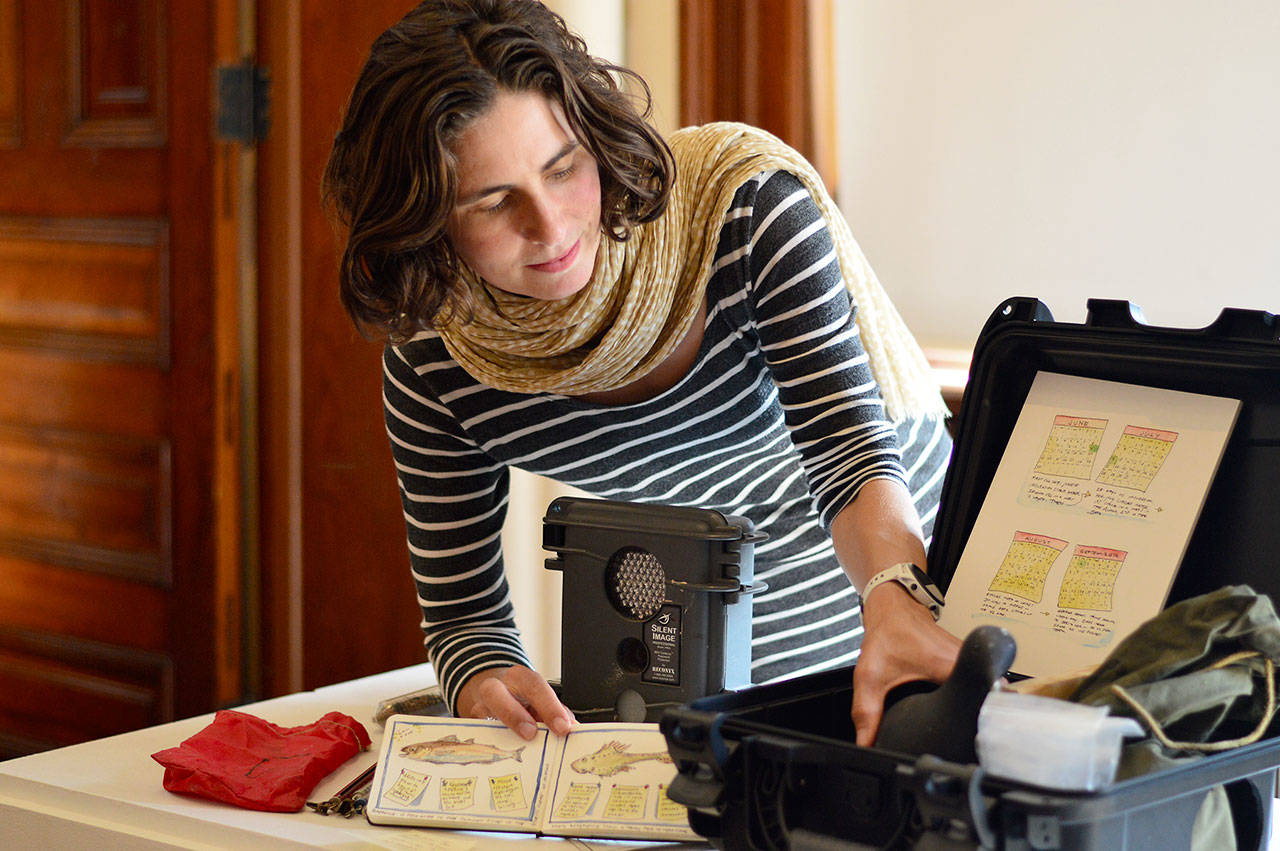PORT TOWNSEND — Walking into the gallery, a space filled with birds, sketches and sky, feels like looking over the traveler’s shoulder as she explored the North Slope of Alaska.
“I’m really drawn to this atmospheric light and space you can feel out on the coast,” said Maria Coryell-Martin, the expeditionary artist whose multimedia exhibition opens today at the Jefferson Museum of Art & History, 540 Water St.
Titled “Witnessing Climate Change,” the show is inspired by Coryell-Martin’s travels to Alaska’s Cooper Island and to the Utqiaġvik Baseline Atmospheric Observatory, the northernmost point of the United States.
After a pandemic-induced delay of more than a year, “Witnessing” will stay on display through December.
Coryell-Martin, who lives in Port Townsend, has assembled dozens of images from her research and creative process: pages from her sketchbook, large paintings, artifacts, even field equipment.On one table, near paintings of Arctic terns and a multi-hued sky, is a crunched-up sardine tin — a polar bear got hold of it — alongside a seal’s mandible.
The Jefferson Museum is open from 11 a.m. to 4 p.m. Thursdays through Sundays, with admission $6 for adults, $5 for seniors and $1 for children.
For information about its exhibitions, which also include “Along the Path,” Marsha Hollingsworth’s show of mixed-media drawings, visit JCHSmuseum.org or phone 360-385-1003.
A museum members’ preview party was slated for this evening, noted Shelly Leavens, Jefferson County Historical Society executive director.
Due to the rise in COVID-19 cases in the county, that indoor gathering has been canceled for now.
“Witnessing Climate Change” will bring a number of public programs in the coming months. They will range from an outdoor art workshop to a speakers’ panel, Leavens said. Details will be found on the museum website’s Exhibitions and Programs pages in early fall.
Coryell-Martin’s show also highlights the nearly 50-year sweep of research by ornithologist George Divoky.
Divoky has been studying the black guillemots of Cooper Island in Alaska since 1972, creating an extended data set that provides evidence of a warming Arctic.
Two summers ago, Coryell-Martin and educator Katie Morrison traveled to Cooper Island to accompany Divoky as he recorded data on the seabirds’ population and health. Out there, the artist sketched with ink and watercolor and did her own audio recordings, which she brought back home.
“I typically use recordings for my studio process,” Coryell-Martin said, adding she paints while listening to the birds, ice and water of the Arctic.
This exhibition is about climate change, yes. But Coryell-Martin doesn’t see it as a bleak harbinger. She finds reasons for hope — and action — in the research conducted in places where she’s traveled and worked.
“We have the information we need,” she said, so now is the time to act.
Voting for environmentally aware candidates “is huge,” as is voting with one’s dollars for products and services, she said.
And many businesses are changing their policies, Coryell-Martin said, including her own, arttoolkit.com. The small company, which will have a brick-and-mortar location on Sims Way later this year, has gone to plastic-free packaging.
Coryell-Martin is also more conscious about how often she flies in a jet, and the availability of carbon offsets.
Grounded by the global pandemic, she has stayed home in Port Townsend and pursued her passion: open-water swimming.
The museum show offers an alternative perspective on global warming, the artist added.
Art, Coryell-Martin said, filters life through the human hand and eye. She sees mixing art with scientific research, as her show does, as another way to share inspiration from the natural world.
“I love bringing science into ‘non-science’ spaces,” she said.
________
Jefferson County senior reporter Diane Urbani de la Paz can be reached at 360-417-3509 or durbanidelapaz@peninsuladailynews.com.

